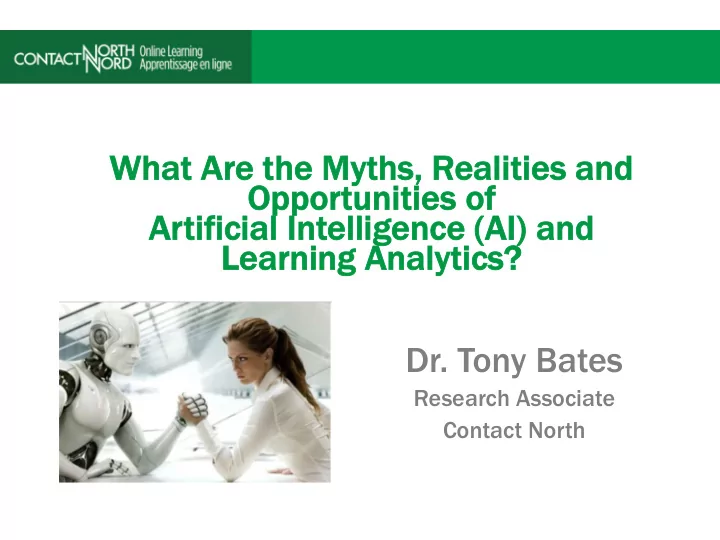

What A Are t the M Myths, R Realities a and Opportunities o of f Artificial I Intelligence ( (AI) a and Learning A Analytics? Dr. Tony Bates Research Associate Contact North www.contactnord.ca
Webinar F Format Aim of series: • Discuss issues raised in Teaching in a Digital Age • Draw on your experiences in addressing these and related issues This webinar: • Artificial Intelligence and Learning Analytics (Chapter 8.7.c)
To Topics Definition/general requirements of AI Types of educational applications Teaching and learning applications Strengths and weaknesses What is holding back AI in HE? Lessons learned about emerging technologies
Ga Gartner’s H Hype C Cycle
Qu Quest stion Where would you place AI on the Gartner curve for: (a) General applications (b) Educational applications What are your reasons?
Def Definitions Intelligent computer systems or intelligent agents with human features, such as the ability to memorise knowledge, to perceive and manipulate their environment in a similar way as humans, and to understand human natural language. Zawacki-Richter et al. (2019)
Types o of E Educational A Applications Image: Zeide, 2019
Teaching a and L Learning Ap Applicati tions Learning analytics/prediction Intelligent tutoring systems Adaptive learning (personalization) Student assessment • Quantitative (comprehension; processes) • Qualitative? Essays? Chatbots
Teaching a and L Learning Ap Applicati tions
Teaching a and L Learning Ap Applicati tions Learning analytics/prediction Intelligent tutoring systems Adaptive learning (personalization) Student assessment • Quantitative (comprehension; processes) • Qualitative? Essays? Chatbots
Teaching a and L Learning Ap Applicati tions
Questions a and C Comments • Any other type of teaching and learning application of AI/learning analytics? • Which have you used? • How well did it work and for what purpose?
Strengths a and W Weaknesses Criteria: • Massive data sets; computing power; powerful algorithms (‘modern’ AI?) • Unique educational affordances? • Develop knowledge and skills needed in a digital age? • Ethical, e.g. bias-free? • Explicability?
Strengths a and W Weaknesses To date: • ’modern’ AI? Not been tried to date; • Affordances? Replicating rather than transforming • Skills? Content focused: memory/ comprehension: behaviourist; • Ethics/explicability: lack of transparency in algorithms/data selection
Questions a and C Comments • What do you think are the strengths of AI in teaching and learning? • What are the weaknesses of current approaches?
What i is h holding A AI b back i in educati cation? System fragmented: not enough data points: large-scale needed Narrow view of learning: behaviourist; memorization Most applications led by computer scientists not educators Emotional/affective/social aspects of learning - but not either/or AI still a sleeping giant
Conclusions A About A AI/ I/LA Disappointing to date Need to re-think way AI is applied to teaching/learning Educators need to be involved more in design/evaluation AI good for content/comprehension Augment or replace teachers? A sleeping giant: get involved!
Conclusions A About E Emerging Te Technologies New not necessarily better than old Wait and see; dip toes or experiment What educational goals/ affordances? Transformation? Need a strong framework for decision-making: SAMR and SECTIONS
Questions a and C Comments • Where would you place (a) AI (b) learning analytics in the SAMR model? (i) now (ii) in the future? • Using the SECTIONS model, what are (a) benefits (b) limits of (i) AI (ii) learning analytics? • Is there a future for AI in education – or is it a myth? • What would make AI more valuable in education?
Recommend
More recommend